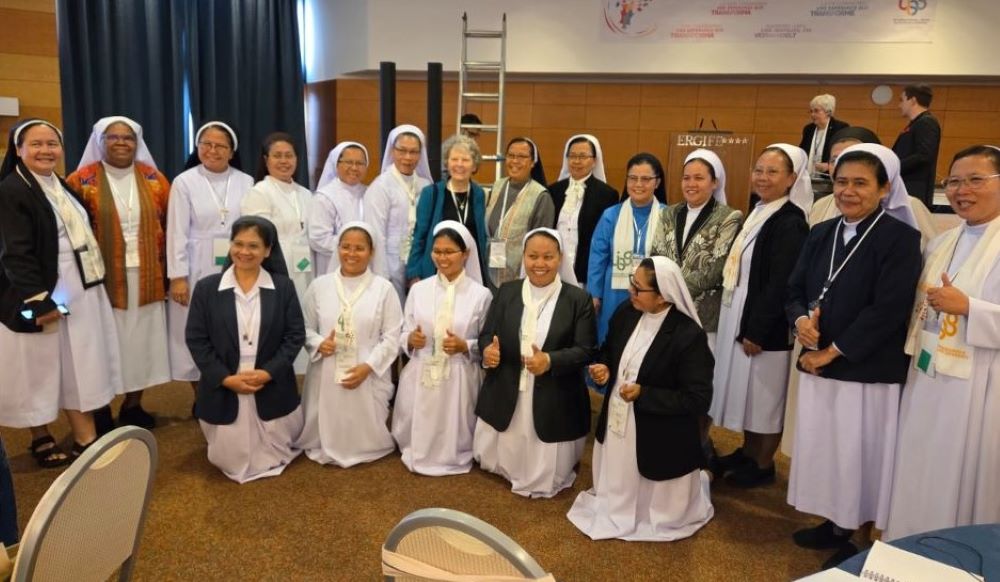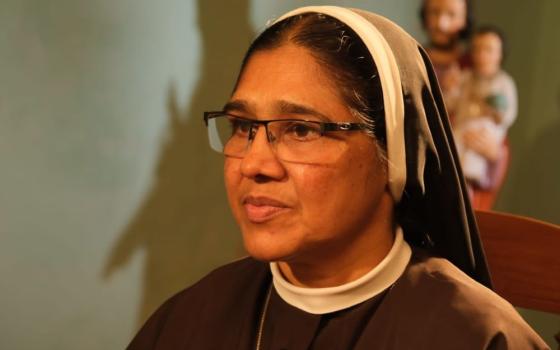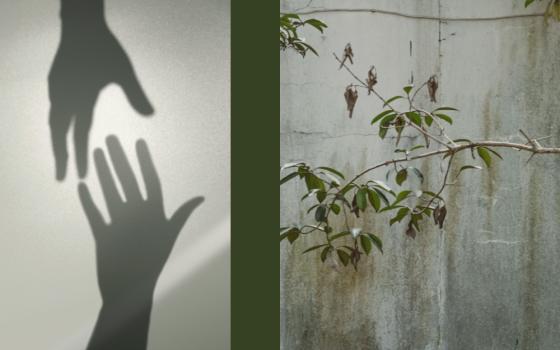Consolota Missionary Sr. Simona Brambilla, the keynote speaker for the UISG general assembly, shared stories of women religious who have lived with Gospel courage even in dangerous mission work. (Courtesy of UISG)
At the general assembly for the International Union of Superiors General (May 5-9 in Rome), one of the most moving and gut-wrenching moments for me was a session that began with questions.
"Who of you here are working in conflict or war areas of the world? Please stand and remain standing." We looked around the room and saw women of courage and deep empathy rise.
"Who of you have sisters working in conflict or war areas? Please stand." Again, we looked around as more and more sisters rose from their chairs. Lastly, "Who of you support sisters who work and live in conflict or war areas?"
This time, no one was left sitting.
We gazed around the room into the face of global religious life, of women willing to stand in person or support the people who suffer, no matter the situation.
As I stood there, I recalled my years of working with the Hilton Fund for Sisters, visiting sisters living and ministering for years in places where war had been going on relentlessly for several generations. They stayed and did not leave their people behind. It was a privilege to be with them even for a few days at a time, hearing their stories, praying with them and experiencing their resilience, but also their pain and at times feelings of helplessness.
I often wondered how they managed the trauma. When I asked, most said they endured with the presence of each other in their community support. That was so many years ago, and yet, even today, there is so little access to psychological and spiritual support in these places of suffering where trauma is an everyday experience.
At the assembly, we also had the privilege of listening to the stories of sisters currently living in these difficult situations: Myanmar, the U.S.-Mexico border and Amazonia. Each shared the pain of their people and what they themselves experience as a presence of care and hope. We also heard encouraging voices describing synodal churches in Ivory Coast and Dominican Republic, and the importance of synodal training of formators who will shape new women in formation. These voices from so many parts of the world also reminded us of being part of a global sisterhood.
A standing ovation welcomed Sr. Simona Brambilla, a Consolata Missionary, when she was announced as our next speaker. She had been a missionary in Mozambique, a difficult region of the world. When Pope Francis had named her the first woman to hold the office of the Prefect of the Dicastery for Institutes of Consecrated Life and Societies of Apostolic Life, sisters rejoiced worldwide. Her appointment continues to generate much hope for women religious. Although I didn't get to meet her personally, her demeanor reflected simplicity, warmth and humor.
Sr. Margaret Maung, a Sister of Our Lady of the Missions, who spoke on the challenges of life in Myanmar during the panel discussion "Religious Women: Bearers of Hope in Demanding Situations." (GSR photo/Joyce Meyer)
Her presentation, "Does Consecrated Life Represent Transformative Hope?" began with a quote from the synod on synodality's final document: Men and women in consecrated life are "called to challenge the Church and society with their prophetic voice." She reminded us that synodal living has been practiced in religious life for centuries. Of course, we all know we may have strayed from these practices ourselves and are being called to reclaim and witness them to our world, particularly with the added challenge of being laboratories of intercultural living.
Brambilla lived as a missionary among the Makua people, a call that was not only about sowing God's word, but "harvesting the life God grows in people and among peoples." She shared a proverb from that harvesting: "God is not like the sun going only through the world, but like the moon going with the stars. If the moon had a bad heart, we would not see the stars."
The moon, according to the proverb, is a humble star that illuminates the night; unlike the sun that blazes brightly and extinguishes the light of other stars during the day, it prefers to coexist with the glow of other stars and planets of the night.
A wonderful storyteller, Brambilla shared that this Makua wisdom could be instructive in the current context of our world where we co-exist in a plurality of thoughts, movements and ways of understanding and living the mission of Jesus. Although we are becoming aware of our smallness — experiencing the aging process of our members and declining numbers — nevertheless, it is our call in this time of "night" to happily embrace our new place in the church: the time of the moon, willing to live in times of waiting, uncertainties and questions. We are challenged to conversion of heart called by the synod, to revision and journey into our deepest identity.

Sr. Joyce Meyer (back row, center) with new Indonesian members of UISG (Courtesy of Joyce Meyer)
Brambilla then gave us stories of fragility, reminding us that when lived with Gospel courage, fragility is a source of hope for others, as demonstrated in the Gospel figures Simeon and Anna, who even in the fragility of old age waited in hope for the Messiah. She also told of the seven Trappist monks of Our Lady of Atlas in Algeria in 1996 who were kidnapped and killed because they "bore witness to fidelity — to God, to a land and to a people." One of them, Christian de Chergé, reflected on their choice to remain in Algeria in that time of danger:
Obviously, my death will appear to confirm those who hastily judged me naïve or idealistic, … but what I shall be able to do, God willing, [is] immerse my gaze in that of the Father, to contemplate with Him His children of Islam, just as he sees them, all shining with the glory of Christ, the fruit of His Passion, filled with the Gift of the Spirit …
A second story took place in Mogadishu, Somalia, in 2006. Sr. Leonella Sgorbati, a Missionary of the Consolata, was struck with seven bullets and killed as she left the children's hospital where she was serving. Before dying, she recognized her attacker, but whispered, "Don't hurt him, he is a poor boy. Forgiveness, forgiveness, forgiveness" — the same words Jesus echoed when he was dying, faithful to his mission.
Advertisement
And in Kamenge, Burundi, in 2014 three Xaverian Missionaries — Srs. Bernardetta Boggian, Olga Raschietti, and Lucia Pulici, elderly women with major health problems — were killed for no reason but their witness of fidelity to mission. They had just returned from home to Burundi to be with their people, a concrete witness of Jesus' love for them.
These are stories of hate and violence, which posed a question that plagues most of us at times: "Why is it that hatred, violence, evil itself, are unleashed against such vulnerable, fragile, helpless creatures — so far from the centers of power, so removed from any pursuit of visibility, impressiveness, triumph or fame?" Brambilla pondered.
"In short, who do such lives threaten? Perhaps they disturb, and even frighten … [because their] fragility inhabited by God terrifies evil," and evil "falters, confused and defeated, before humility, forgiveness, loving surrender, passionate emptying and obedience to Love."
The contrast of worldly power and fragility inhabited by God were evident in Brambilla's visit to Kabul, Afghanistan, in 2018. This story touched me deeply as she told of an interdenominational women's community I had also visited about 10 years ago. The sisters' small school for children with disabilities, which opened around 2005, had to be left behind in August 2021 when the Taliban once again took control.
Brambilla and the sisters had gone to Mass at the only Catholic chapel in Afghanistan, housed in the Italian embassy and heavily militarized for security. Military personnel of big, strong men, arriving to attend Mass, had to remove their camouflage, bulletproof vests, helmets, visors, boots, belts and machine guns before entering.
As Brambilla watched this display of worldly power, she saw beside her the vulnerability of two women, fragile, wearing traditional Afghan dresses and soft Islamic veils that revealed a different kind of power. A NATO officer standing near Brambilla also noticed and commented: "These two women, extraordinary, humble and dedicated, are doing infinitely more for these people than all of us military men and women combined."
It is impossible for me to relay the power, depth and beauty of Brambilla's entire presentation in a blog. Her ending prayer in this year of Jubilee was heartfelt: May consecrated life "truly be a pilgrimage of hope that transforms, sustained and nourished by the prayer and witness of so many women and men of God who have lived and continue to live the mild and powerful force of the hope that does not disappoint."







